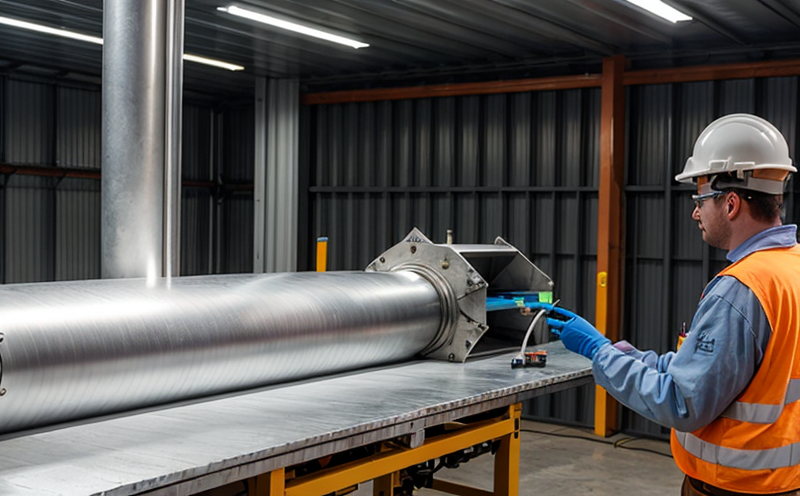ISO 1133 Melt Flow Rate Testing of Polymer Materials
The ISO 1133 standard is a globally recognized protocol used to measure the melt mass flow rate (MFR) or melt volume flow rate (MVFR) of thermoplastics. This measurement provides critical insights into the processing and performance characteristics of polymers, particularly in the energy sector where materials need to withstand high stress conditions during manufacturing processes.
The Melt Flow Rate test is essential for quality assurance in sectors such as renewable energy, where components like turbine blades, connectors, and structural parts must meet stringent physical property requirements. By accurately measuring the melt flow rate, manufacturers can ensure that their polymers are within acceptable limits, thereby enhancing the reliability of their products.
During this test, a fixed weight or force is applied to a heated extruder screw, which forces polymer pellets through a die with a specific diameter and length. The amount of material that flows out per minute under these conditions determines the MFR value. This value can range widely depending on the type of polymer being tested and its molecular weight.
The significance of this test extends beyond just quality assurance; it also plays a crucial role in research and development (R&D). Engineers can use the results to optimize processing parameters, develop new formulations, or select appropriate materials for specific applications. For instance, higher MFR values generally indicate lower molecular weights and more fluid-like behavior, which may be desirable for certain casting processes but not for extrusion.
In the context of renewable energy, particularly in wind turbine manufacturing, selecting polymers with optimal melt flow rates can lead to better adhesion between components, improved fatigue resistance, and enhanced overall performance under extreme conditions. Additionally, this test helps in ensuring compliance with international standards such as ISO 1133 itself, ASTM D1238, or EN ISO 1133.
To perform an accurate MFR test, it is important to follow the prescribed procedure meticulously. Specimens should be conditioned to a specific temperature and humidity level before testing begins. The extruder barrel must reach the specified temperature, typically around 200°C for most thermoplastics used in renewable applications. Once calibrated, the machine is ready to perform multiple measurements at different weights or forces.
It's worth noting that while MFR tests are widely accepted, they do have limitations. For example, they cannot provide information about the molecular weight distribution of a polymer directly; instead, they offer an average value that reflects both chain length and branching structure. Therefore, when designing products for demanding environments like offshore wind farms or solar panel structures, it's often necessary to combine MFR data with other analytical techniques.
At Eurolab, our team of experts ensures that every melt flow rate test adheres strictly to the ISO 1133 standard. Our state-of-the-art facilities provide precise measurement tools and experienced personnel who understand both theoretical aspects and practical implications of this testing method. Whether you're looking for routine quality checks or detailed research reports, we offer comprehensive services tailored to meet your needs.
Scope and Methodology
| Procedure | Description |
|---|---|
| Conditioning of Specimens | Specimens must be conditioned to a temperature and humidity level that matches the test conditions. |
| Heating Extruder Barrel | The barrel should reach the specified temperature, usually around 200°C for thermoplastics used in renewable applications. |
| Calibration of Machine | The machine is calibrated to ensure accurate measurement under standard conditions. |
| Measurement Parameters | Different weights or forces are applied, and the amount of material that flows out per minute is recorded. |
The Melt Flow Rate test involves several steps to ensure accurate results. First, specimens need to be conditioned according to the specified temperature and humidity levels before being placed into the heated extruder barrel. The machine must then reach a stable operating temperature, usually around 200°C for most thermoplastics used in renewable applications. Once calibrated, various weights or forces are applied, and the amount of material that flows out per minute under these conditions is measured.
It's crucial to note that MFR tests can vary based on the type of polymer being tested and its molecular weight. Therefore, understanding the specific requirements for each material is essential when interpreting test results. For example, higher MFR values might be preferable for certain casting processes but not suitable for extrusion due to potential issues related to adhesion between components.
The data obtained from these tests can help engineers make informed decisions about material selection and processing parameters during product development. This information is particularly valuable in sectors like renewable energy where materials need to withstand harsh environmental conditions while maintaining optimal performance characteristics.
Eurolab Advantages
At Eurolab, we pride ourselves on offering unparalleled expertise in polymer material testing services. Our state-of-the-art facilities and highly skilled professionals ensure that every melt flow rate test adheres strictly to the ISO 1133 standard. By leveraging our extensive experience and cutting-edge equipment, clients can trust us with their most critical projects.
Our comprehensive suite of services includes not only routine quality checks but also detailed research reports that provide deep insights into material behavior under various conditions. Whether you require compliance testing or advanced analytical support for R&D initiatives, Eurolab is your partner in achieving excellence across the entire value chain.
- Accurate Measurements: Leveraging our sophisticated instruments and methodologies guarantees precise and reliable results.
- Compliance Assurance: Ensuring all tests comply with international standards such as ISO 1133, ASTM D1238, or EN ISO 1133.
- Expertise & Knowledge: Our team comprises experienced professionals who understand both theoretical aspects and practical applications of MFR testing.
We also offer additional services such as custom formulation trials, post-processing analysis, and consultation on best practices for material handling. These增值服务包括不仅常规的质量检查,还包括详细的调研报告,这些报告提供了关于材料在各种条件下的行为的深刻见解。无论是需要合规测试还是为研发项目提供高级分析支持,Eurolab都是您价值链全程中的最佳合作伙伴。
用例和应用示例
- 质量保证:通过准确测量熔体流动速率,确保材料符合规定的性能标准。
- 研发支持:利用测试结果优化加工参数或开发新型配方。
- 材料选择:根据特定应用的需求选择合适的聚合物材料。
以下是MFR测试的一些具体应用场景:
- 风力发电: 用于制造风机叶片、连接器和其他结构部件,以确保它们在极端条件下的可靠性和性能。
- 太阳能光伏: 在制造太阳能电池板框架和支架时选择具有良好熔体流动特性的聚合物材料,有助于提高组件的粘结强度和疲劳耐久性。
- 海洋工程: 用于生产海上风力涡轮机的基础结构件,以应对腐蚀性和高应力环境中的挑战。
通过这些测试,制造商可以确保他们的聚合物材料在各种条件下都能表现出最佳性能,并且符合国际标准。例如,在EN ISO 1133、ASTM D1238和ISO 1133中都有明确规定。此外,结合其他分析技术,如核磁共振光谱法(NMR)或凝胶渗透色谱法(GPC),可以帮助更全面地了解材料的性能特性。





